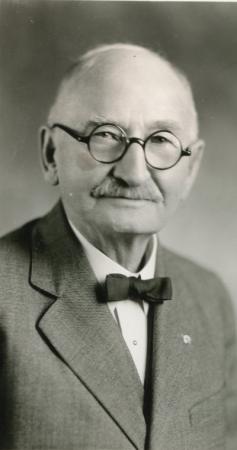George Vincent Ayres
George Vincent Ayres
November 1, 1852 - May 29, 1939
“Mr. Ayres was a man of genial nature, sincere and wholesouled; he had the esteem and confidence of all who knew him, and his host of staunch friends in business, fraternal, political, and social circles will learn of his passing with deep regret, though grateful that they had the pleasure of knowing him during a long and active life” read George Vincent Ayres’s obituary from the Daily Pioneer- Times on Tuesday May 30, 1939.
George Vincent Ayres was one of those rare individuals who lived life to the fullest. Known for his quick wit and larger than life personality, Ayres went on to build a wholesale hardware empire in the Black Hills of South Dakota. Ayres also made a name for himself amongst the numerous local and state fraternal organizations of the day. Born in Monroe Township, Wyoming County, Pennsylvania on November 1, 1852, Ayres was one of seven siblings born to parents who believed in manifest destiny. The family eventually settled in Beatrice, Nebraska. Ayres’s adolescence was “amid the scenes and conditions of the pioneer era”, as one newspaper recalled. Upon completing public school in Beatrice, Ayres accepted a position as a drug store clerk until 1876. That year, at the age of 24, he bid farewell to his family and traveled to Cheyenne, Wyoming and eventually to the Black Hills. Ayres chronicled much of these early experiences in a personal diary including meeting Methodist Minister Henry Weston Smith enroute to the Black Hills and attending the first recorded religious service in the mining camp of Custer City.
It would take almost a year for Ayres to find suitable work that would eventually chart his success for the ensuing years ahead. In September of 1877, Ayres found employment at Richard C. Lake’s hardware store in Deadwood. Five years later, Ayres purchased an interest in the business, a decision that would secure Ayres and his family’s success in the wholesale hardware business for over one hundred and ten years. By the turn of the twentieth century, Ayres had established himself as a reputable businessman and fellow brethren in many of the fraternal organizations. In Freemasonry, Ayres joined the Masonic order in 1874 and was prominent in Masonic circles of the state for many years. He served Deadwood Lodge #7 as Master for three years, being first elected to that office in 1884. On June 13, 1888, he was elected Deputy Grand Master of the Grand Lodge of Dakota, and on June 12, 1889, Grand Master of the Grand Lodge of Dakota, which then created the Grand Lodge of North Dakota, and changed the name of the Grand Lodge of Dakota to the Grand Lodge of South Dakota, serving one year. He retains the distinction of being the last Grand Master of the Grand Lodge of Dakota and the first Grand Master of both the Grand Lodges of North Dakota and South Dakota. Ayres is also accredited for establishing what would become known as the Grand Charity Fund to help fellow South Dakota Masons and their families in need. Ayres became a charter member and past president of the Society of Black Hills Pioneers.
In his later years, Ayres filled several civic rolls serving as city commissioner, county commissioner and member of the South Dakota House of Representatives. During his tenure as a Lawrence County Commissioner, Ayres became a staunch proponent of the “Good Roads Movement” in Lawrence County. He took an active role in supporting the development of the Black and Yellow Trail (Chicago, Black Hills and Yellowstone Park Highway, extending along U.S. Highway 14 from Yellowstone Park to Chicago) and the Deadwood and Denver Highway (Deadwood, South Dakota to Denver, Colorado along U.S. Highway 85). Ayres legacy is still seen today along Deadwood’s historic Main Street. Shortly after purchasing the Bullock Hotel in 1904, Ayres removed Bullock’s name from the cornice and replaced it with “Ayres”.

